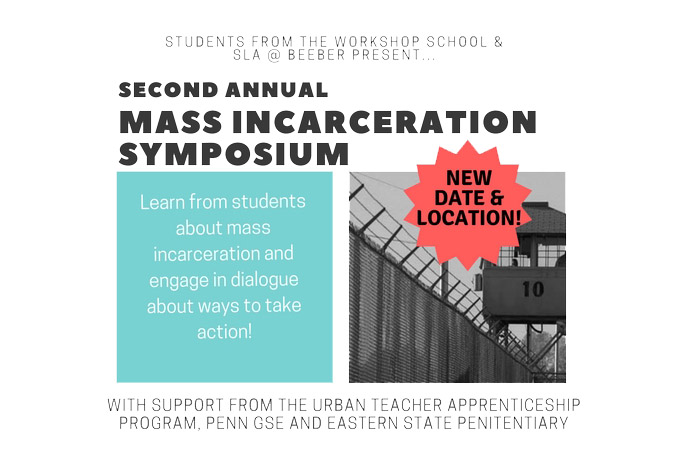Penn GSE alums lead Philly students on exploration of mass incarceration in the US
In 2017, James Elish, a teacher at the Science Leadership Academy @ Beeber, took his political economics class to see research projects by students from West Philadelphia's Workshop School on mass incarceration in America.
The Workshop students explained how they had researched issues like the school to prison pipeline, inequitable representation in the court system, and the impact of the war on drugs on prison populations. Then, the Workshop students began to offer suggestions for how young people could work to change the system.
Elish's students were drawn into the dialogue, and Elish was so impressed, he asked Rebecca Coven, the Workshop School teacher who organized the project and fellow Penn GSE graduate, if the schools could partner on future work.

Each team of students had to create action items they could take to change the aspect of the justice system they had investigated.
"My goal as an educator is to help my students become active and engaged citizens in their communities," said Coven, who is a certified English and social studies teacher and serves as an advisor for 18 10th grade Workshop School students. "I want them to see they can make a change, and they do have a voice. With this project, I wanted them to learn how to take action, which is a challenging thing for anyone to do, but especially high school students."
Both the Workshop School and SLA@Beeber are project-based learning schools, where students learn math, science, English, social studies, and other courses through interdisciplinary projects designed to solve problems in their communities.
Learn about Penn GSE's Project-Based Learning Certificate Program
Creating interdisciplinary lessons like these, where teachers help students discover knowledge rather than dictating facts to them, is hard. Teachers have to be willing to give up some control and partner with students, Coven said. But when this approach works, like it did with the mass incarceration projects, the payoff for students is enormous.
Penn GSE prepared them to lead lessons like this, Coven and Elish said. In the Urban Teaching Apprentice Program, students experience more than 800 hours of field time — more than twice the student teaching experience of the average program — to develop research-based practices.
UTAP saw the symposium as a continuation of Penn GSE's vision for teacher education, said director Kate Kinney Grossman.
"One of our goals in redefining teacher education is to continue to support our teachers after graduation so they can put the lessons they learned into practice," Grossman said. "This project in particular fits that mission, because it empowers students to be the creators and producers of knowledge while tackling a real-world problem that affects our community."
When the day came for students from the Workshop School and SLA@Beeber to present their findings, Elish said the conversation was even better than he had hoped.
"To see them engage in that discussion and discuss the reasons why they suggested what they suggested, and to have the students from the Workshop school listen to the Beeber students and vice-versa, it was just wonderful to see," Elish said.
Other Philadelphia public schools have already asked about potentially joining next year.
